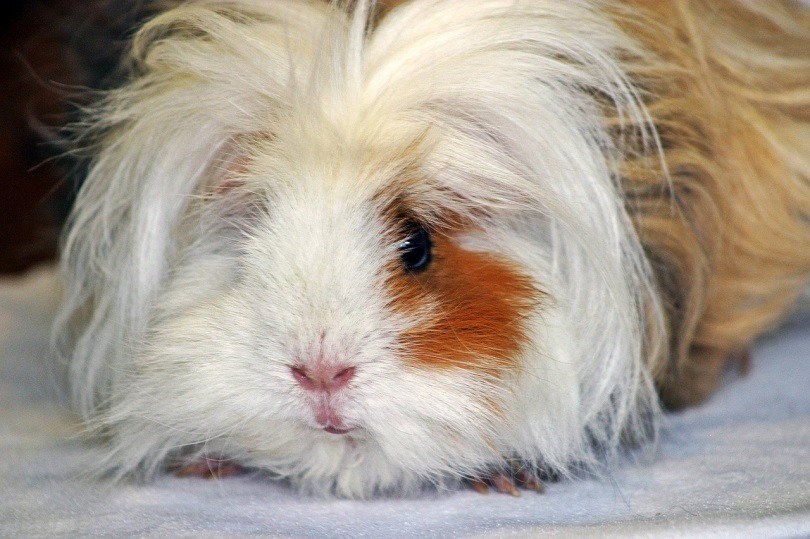Why Do Guinea Pigs Squeak? 8 Possible Reasons Vet-Verified Reasons

Updated on
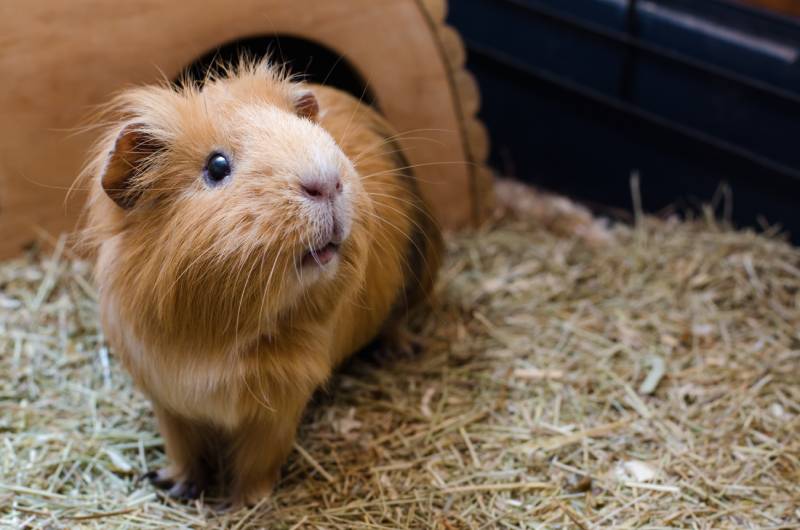
Guinea pigs are intriguing little animals. They only sleep around 4 to 6 hours a day, so they make active pets that owners can spend time watching and interacting with. Their prey instincts mean they are inclined to hide when in danger, rather than running or fighting.
Another reason for their popularity with some owners is the vast array of noises and vocalizations they can make. Guinea pigs seem to have a noise for every occasion, and by listening to the type of noise they are making, it is possible to at least get some idea of the message they are trying to convey.
As with any animal, context is key, so you should have a look at your cavy’s surroundings and determine whether anything unusual or extraordinary has happened and then take action to answer your guinea pig’s call. Below are 8 possible reasons why your guinea pigs might be squeaking or making other noises that can easily be mistaken for squeaking. Please note that a squeak is also referred to as a wheek or week by some.
The 8 Reasons Why Guinea Pigs Squeak
1. Dinner Time
Guinea pigs are eating machines. They need to eat regularly, especially hay or grass, as the fiber in the hay helps with digestion while the grinding motion of the chewing also helps maintain healthy teeth and prevent the teeth—which keep growing throughout a guinea pig’s life—from becoming overgrown. They also learn routine and are especially keen that you should follow a feeding schedule.
If your guinea pigs believe it is time for food and that food hasn’t been forthcoming, they will squeak loudly to get your attention and let you know of your feeding failings. This is probably the most common cause of guinea pigs’ squeaks and one that owners will need to get used to, and it is easy to identify if this is the problem. Check the food bowl and hay bowl, and check whether it is feeding time. Guinea pigs can quickly learn if certain activities you perform are related to food (such as opening a fridge door) and will often squeak in anticipation of a treat whenever you do so.
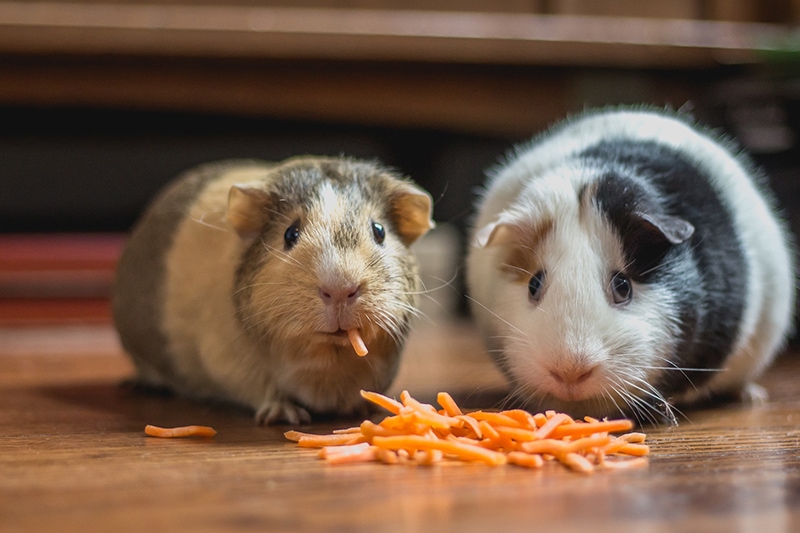
2. Attention Seeking
Wanting food is one reason that guinea pigs might want to catch your attention. If you have an especially friendly guinea pig, one that has been well-socialized and is used to regular handling, your cavy could be letting you know that it is time to be picked up or time for you to play. If your guinea pig wants to be picked up, they will likely approach the edge of their enclosure, near where you are while making sounds because they know this is likely to get your attention.
3. Excitement
Guinea pigs also make noise when they’re excited. The excitement could be because it is dinner time or because you’ve put a favorite treat in the hutch. It could be that your guinea pigs are having a really good time playing, or it could genuinely be that yours is excited to see you walk into the room.
4. Comfortable in Your Presence
One theory postulates that because they are prey animals, guinea pigs would need to be quite quiet in the wild. The more they squeak, the more likely they are to attract the attention of predators. However, this is mere speculation, as the guinea pigs we keep as pets (Cavia porcellus) are not found anywhere in the wild.
Nonetheless, the theory postulates that guinea pigs will reserve squeaking for occasions when they believe they are safe. This means that, for your guinea pigs to squeak while in your company, they must feel very comfortable around you and not view you as any kind of a threat. If your guinea pigs squeak when you pick them up and there is no other obvious cause of the noise, it may be in anticipation of spending time with their favorite human.
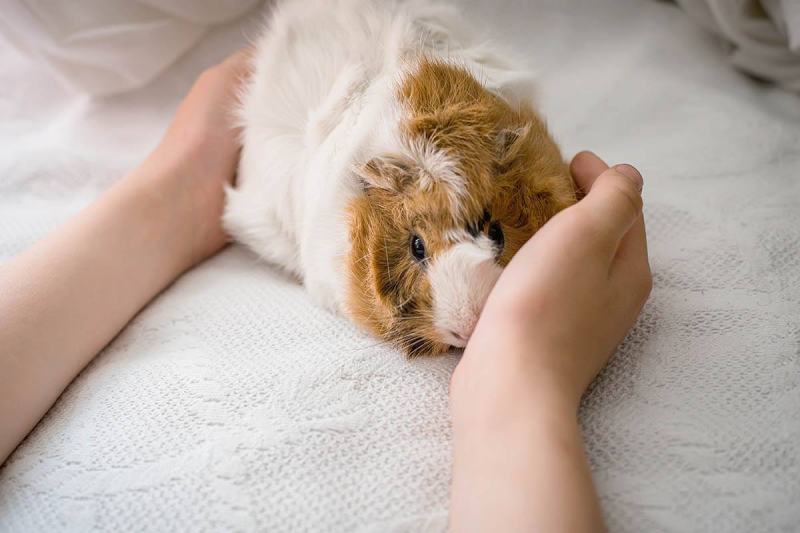
5. Learned Behavior
As sociable animals, guinea pigs do learn from one another. There may even be some level of inherited learning, as guinea pigs are very well developed when they’re born (also known as precocial).
As such, your guinea pigs may not even know why they are squeaking but still do so at certain times or to mark certain events. If you can’t find any other reason for the squeaking, your guinea pig might be making noises simply because they feel like the right thing to do.
6. Fear and Anxiety
A guinea pig that’s experiencing fear, anxiety, or pain will likely scream or squeal. However, many first-time owners may misconstrue this call as a squeak.
A squeal can be a sign of impending danger, although you may not perceive something to be dangerous in the same way as your Cavie does. The danger could be close and imminent, such as an approaching pet, or it could be further away. If your Cavie can hear unusual noises, perhaps through an open window or even on the TV, these noises might make your Pig anxious and cause it to squeal.
Look for any unusual activity around your Guinea Pig or listen for noises that are out of the ordinary and that might be causing the panic.
7. Pain
Cavies are prey animals, and even if they are in pain or ill, your pet guinea pigs may be more inclined to squeak or squeal if they are in pain. Look for signs of injury or other signs of illness, and if you believe something is wrong, contact your vet for advice.
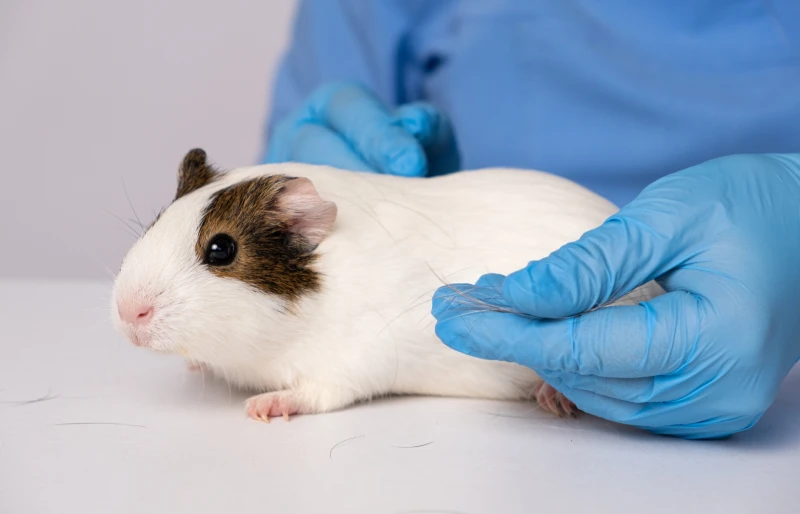
8. Warning
Although guinea pigs will usually choose to hide or run, rather than fight, there are occasions when they might bite or nip. They may also fight with one another if cage conditions are incorrect or if one guinea pig feels threatened by another. A loud squeak may be sounded as a warning from one guinea pig to another, and it could mean that a fight is about to ensue. If your cavy squeaks at you, as a warning, it is best to back away and give them some room.
If the alarm is being sounded at another guinea pig, you should separate them and look for ways to better introduce them or improve their conditions.
How Do I Stop My Guinea Pigs from Fighting?
Make sure the cage you have is big enough for the both of them and that they have plenty of things to do as well as tunnels and holes to hide in. One of the most common reasons for warring guinea pigs is that they don’t have enough room in their enclosure. However, it may also be a sign that one of your guinea pigs is ill, so it’s a good idea to monitor your cavies for signs of illness.
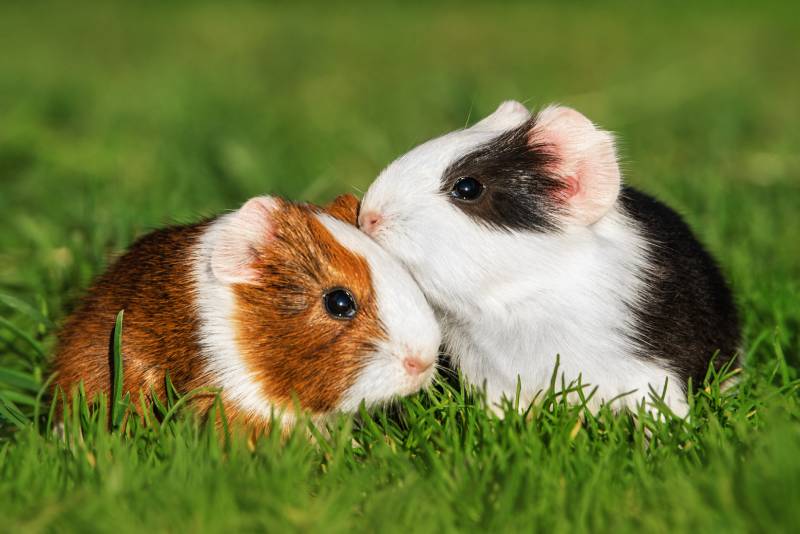
Does Squeaking Mean a Guinea Pig Is Happy?
There are various reasons why guinea pigs make noise, and some can chatter and mumble seemingly all day long. Squeaking might indicate that your guinea pigs are waiting for their dinner, are anticipating you getting them out for some playtime or handling, or that they are excited and having fun.
Why Is My Guinea Pig Chirping Like a Bird?
Guinea pigs really do have a lot of different vocalizations and noises. One such noise sounds similar to the noise of a bird chirping, and this can signify any of a variety of occurrences or feelings, but one of the most common reasons for chirruping is that your guinea pigs are sounding an alert. Look for possible causes of concern and try to remedy the situation if possible.
Conclusion
Guinea pigs make fascinating pets. Among their fascinating idiosyncrasies is their impressive vocal repertoire. While they do have a variety of different noises in their vocabulary, squeaking is one of the more common noises.
A squeak can convey an array of emotions and alerts but generally signals positive emotions or feelings. For first-time owners, though, a squeak might be misconstrued as a squeal or scream, which generally signifies negative emotions (such as fear, pain, or distress).
Featured Image Credit: Dev_Maryna, Shutterstock


